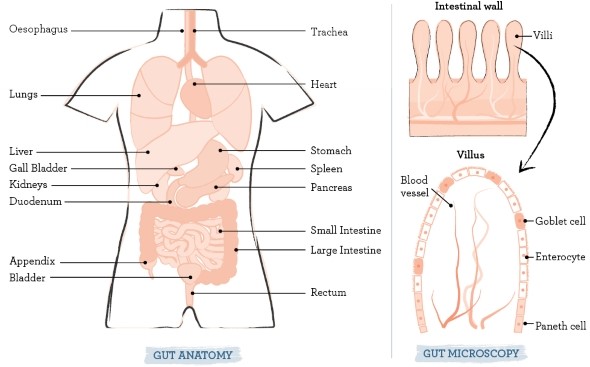Go with your gut: improve your gut health and your brain

Dr Emma Parry offers an update on the gut revolution, and shares why she’s pro probiotics.
You would have to have been hiding under a rock to have missed the fact that gut health is big news. So what’s it all about? In this article I’ll outline what we know about the microbiome, why it is important for gut and wider health, how to keep it healthy and when a probiotic can be helpful.
The gut is the tube which runs from the mouth all the way to the anus, and its main function is to break down and absorb nutrients. (See image below) The main area for absorption is the small intestine, which is a long narrow muscular tube coiled up in the abdomen. The small intestine has a very complex internal surface when viewed under a microscope. (See image below) Made up of a series of mountains and valleys, its surface area is very large. On the lining surface, as well as cells for absorption of food, it has cells involved in immunity, hormone production and cells which produce neuro-transmitters (particles that stimulate nerves).

THE GUT-BRAIN AXIS: FOOD FOR THOUGHT
The gut is actually the largest sensory organ in the body. It’s often called the second brain, as it contains many nerves in the gut wall. The nerves transmit either from the gut to the brain, or from the brain back to the gut.
The nerves that travel to the gut from the brain control the muscles in the gut wall that propel the food along. A case in point is what often happens to your gut when you’re nervous. The stress created by an exam, for example, leads to increased firing of the nerves to the gut, which then leads to the awful cramps and diarrhoea that many people suffer from when under pressure.
So where do the nerves that start off in the gut end up in the brain? Research shows that these nerves travel to a number of areas which control such things as self-awareness, morality, fear, emotion, memory, motivation and ‘gut feeling’.

So, the concept of the gut-brain axis is just that. The recognition that there is a complex and intimate connection between our gut and our brain.
Back to the lining of the gut. On the surface of these lining cells is a layer called the microbiome. This is bacteria encased in a slimy substance called a biofilm. These are usually the ‘good bacteria’ that help to ensure the cells of the bowel wall are healthy and protected from ‘bad bacteria’ and the substances these might release. When bad bacteria are predominant on the surface of the bowel lining, this can lead to inflammation and affect the function of the cells which make up the lining. Given the lining contains cells involved in food absorption, immunity, hormone production and nerve signalling, it becomes clearer as to why gut health is so important.
TAKING CARE OF YOUR GUT
So how do we get a healthy gut, and in particular, a healthy set of bacteria or microbiome? One easy way is to incorporate foods into your diet which will contain these bacteria and/or encourage the growth of good bacteria. Step in, fermented foods.
☙ Yoghurt is the most commonly consumed fermented food. Yoghurt is made from milk fermented with bacteria. Most commonly, lactic acid bacteria and bifido bacteria are utilised. However, not all yoghurts contain live bacteria so it’s important to check the label.
☙ Sauerkraut and kimchi consist of fermented cabbage and vegetables, and hail from Eastern Europe and Korea respectively. They’re now often sold in supermarkets and health food stores and will keep well in the fridge. Like yoghurt, it’s important to check that they contain live bacteria, as some are pasteurised (which will destroy the bacteria).
☙ Kefir, originally from Turkey, is an increasingly popular milk-based drink, and starter powder and kits are now available. The kefir grains (which consist of lactic acid bacteria) are added to cow’s or goat’s milk. The flavour can be enhanced by adding fruit syrups, such as blackberry.
☙ Kombucha is a fermented tea drink with live bacteria, originally from Asia. It’s promoted widely but there is less evidence of a benefit than some of the other options.
For those who aren’t keen on any of these options, probiotics come into the equation. A probiotic is a supplement containing a selection of bacterial strains considered to be beneficial. Not all probiotics are the same though. The type of strains are important, as some strains are more useful for some conditions than others. Also, some strains have more research for specific situations behind them than others.
PROBIOTICS FOR MOTHERS
For expectant mothers, having a healthy microbiome is important for a number of reasons. For a mum’s gut health and comfort (think bloating, cramping and constipation), a healthy microbiome is vital. Also, research carried out recently at the University of Auckland suggests that the effect on mood could also be valuable, which makes sense when you consider the fact that gut cells include cells which affect nerve firing, and the important mood areas in the brain the nerves link to. In this study women took either a placebo or a probiotic called lactobacillus rhamnosus. The women having the probiotic scored better on depression scores. Further research is planned here. Research is also ongoing in the area of gestational diabetes, pre-eclampsia (high blood pressure in pregnancy) and preterm labour. These studies will give us more information on whether probiotics are useful for prevention or reduction of effect in these pregnancy complications. Some research also shows that the maternal intake during pregnancy of some bacterial strains (in particular, lactobacillus rhamnosus) can lead to a reduction in eczema in the child.
When a baby is born, it will usually pass through the vaginal canal. Over the next few days and weeks, baby’s gut (which contains no bacteria at birth) builds up bacteria and a microbiome, collected from his mum’s vaginal canal and the skin of his carers. At the time of delivery, a healthy maternal gut microbiome is important, as this affects the vaginal microbiome. We also know that, even if a mother has a Caesarean section without any labour, the type of microbiome she has is important as it predicts the type of microbiome the baby develops. Studies are showing that the best microbiome for the baby to have is one that is passed on from his mother and father. Another good reason for early skin-to-skin contact between a baby and his parents.
Many mothers have antibiotics at the time of delivery or soon after. Antibiotics can upset the microbiome equilibrium as they often will ‘kill off’ the good bacteria, and allow bad bacteria to get a foothold. Probiotics are important in this setting to ensure that the mother has a healthy microbiome, both for herself and the baby at the time of birth.
PROBIOTICS FOR THE WIDER FAMILY
Probiotics can also be good for babies, toddlers and children. Some strains have been shown to improve immunity and reduce time off kindy/school for sickness, in addition to gut health benefits. Probiotics can come in the form of capsules, powder or drops, and these days most are developed to be shelf-stable.
There are many different probiotics on offer, and options for every member of the family. Some strains are good for balancing metabolism and help with blood sugar and cholesterol levels, and others are good for the gut-brain axis and improve mood. Research is ongoing for the use of probiotics in such diverse conditions as diabetes, dementia and Alzheimer’s.
MAKING YOUR SELECTION
So which is the right probiotic to use? This will depend on a number of factors, but particularly the benefit you’re looking for. Not all probiotics are the same, and more strains at higher counts is not necessarily an advantage. Where possible, choose a probiotic that has research behind the strain for the benefit you are looking for. You may at times wish to be on more than one probiotic, eg a metabolic profile benefit and a mood benefit.
It is also a good idea to choose a probiotic which contains a prebiotic. A prebiotic is a substance which is ‘food’ for the good bacteria in the probiotic. So, effectively, they encourage the growth and colonisation of the strains of bacteria in the probiotic. Your pharmacist is often a good source of information on the best choice of a probiotic.
A healthy microbiome is important for gut health but also has other far-reaching effects. The gut has functions that relate to nerves, hormones and immunity, as well as the healthy breakdown and absorption of food. An unhealthy gut has been associated with a range of conditions. Consuming fermented products and/or taking a probiotic is a good way to ensure a healthy microbiome. However, it is important to choose a probiotic that is designed for your stage of life and the health benefits you desire to receive.
|
Dr Emma Parry is an obstetrician, gynaecologist and maternal foetal medicine subspecialist based in Auckland. |

AS FEATURED IN ISSUE 43 OF OHbaby! MAGAZINE. CHECK OUT OTHER ARTICLES IN THIS ISSUE BELOW

















